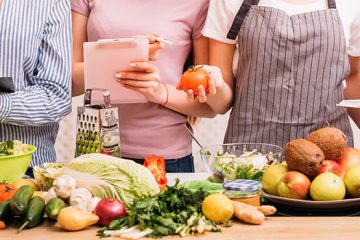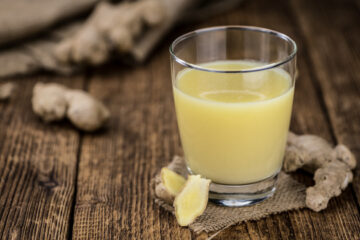Are you thinking about going vegan this January?
‘Veganuary’ is a campaign that has been running since 2014, encouraging thousands of people worldwide to try a vegan lifestyle for at least one month of the year. Over 580,000 people signed up for the ‘Veganuary’ campaign in 2021 in over 208 countries!
What is veganism?
Vegan diets exclude all meat, poultry, fish, dairy products and eggs. Some vegans may also choose to exclude foods derived from animals, such as honey.
Here are just some of the health benefits of following a vegan lifestyle
- A vegan diet can be higher in fruits and vegetables, nuts and legumes. These are all great sources of fibre, as well as being low in cholesterol and saturated fats.
- Those following a vegan diet were found to have a decreased risk of type 2 diabetes1 and reduced blood cholesterol 2
- Vegans also have a lower risk of certain cancers 3
Are there any health concerns when following a vegan lifestyle?
Sometimes a vegan diet can lack adequate protein, so be sure to vary your protein intake through sources such as beans, lentils, tofu, tempeh, seitan, soya (edamame) beans, nutritional yeast, nuts, seeds and vegan Quorn products regularly.
There are some micronutrients that may be harder to get from a vegan diet. These include Vitamin B12, Vitamin D, calcium, iodine, zinc, iron and omega-3 fatty acids.
Good calcium sources in a vegan diet include vegetables such as kale, pak choi, broccoli and collards, as well as sesame products such as tahini. Spinach and chard contain calcium, but they also contain oxalates, which hinder calcium absorption. Other calcium sources are chickpeas, soybeans and figs. Be sure to choose a plant-based milk that is fortified with calcium and iodine. You can also buy calcium-set tofu (containing calcium sulphate).
Plant based sources of iron include beans and lentils, chickpeas, tofu, chia and linseeds, nuts, pumpkin seeds, kale, dried figs and apricots, quinoa and fortified cereals. Vitamin C can help increase iron absorption (foods such as berries, oranges, broccoli, peppers, cabbage and potatoes) whilst tannins found in tea and coffee can hinder absorption.
Sources of zinc include beans, nuts and seeds, mushrooms and wheat germ. Some cereals are also fortified in zinc. Fermented foods such as tempeh and miso can help increase zinc absorption.
Keep in mind that certain foods such as grains, nuts, seeds and legumes also contain phytates, which can reduce absorption of zinc and iron.
Do I need to take supplements?
Some nutrients can be particularly hard to source on a vegan diet, so supplementing in certain cases is recommended. This includes iodine, as most iodine sources are from dairy products and seafood.
You can find vegan sources of Omega-3 such as walnuts, flaxseeds and rapeseed oil. Omega-3 supplements made from algae are available and are suitable for vegans.
The main source of Vitamin D is sunlight, so it is recommended for everyone in the UK to supplement during the winter months of October-April.
Some vegan foods are fortified with vitamin B12 (such as plant-based milks, soy products and cereals), though it is advised to take a supplement to help meet requirements.
However, before taking any supplements, please discuss with a Registered Dietitian or your GP first.
It’s certainly possible to have a varied and healthy balanced lifestyle whilst following a vegan lifestyle. Plan ahead with meals and snacks to ensure you are getting in a range of foods to provide you with the essential nutrients that can lack from plant based foods or consider supplements.
By Reema Patel, Registered Dietitian, MSc
References:
1 – Tonstad S, Butler T, Yan R, Fraser GE. Type of vegetarian diet, body weight, and prevalence of type 2 diabetes. Diabetes Care. 2009;32(5):791-796
2 – Bradbury KE, Crowe FL, Appleby PN, Schmidt JA, Travis RC, Key TJ. Serum concentrations of cholesterol, apolipoprotein A-I and apolipoprotein B in a total of 1694 meat-eaters, fish-eaters, vegetarians and vegans. Eur J Clin Nutr. 2014;68(2):178-183.
3 – Tantamango-Bartley Y, Jaceldo-Siegl K, Fan J, Fraser G. Vegetarian diets and the incidence of cancer in a low-risk population. Cancer Epidemiol Biomarkers Prev. 2013;22(2):286-294







